Kumanjayi Walker murder trial begins as country holds its breath
The case is believed to be the first in modern Australian history in which a serving police officer has faced murder charges over an Indigenous death in custody.
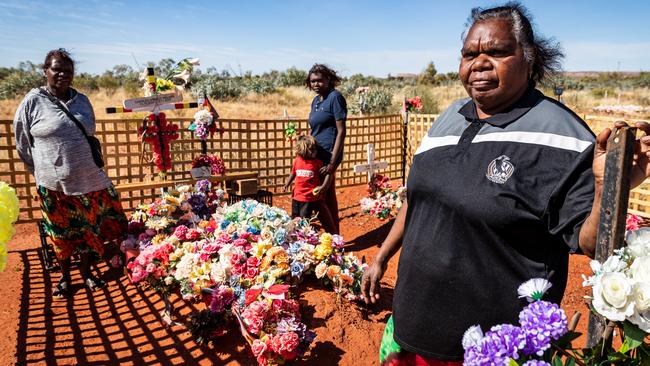
Outside the house where Kumanjayi Walker died, there is an Aboriginal flag, a mural of a cross, and a display of plastic flowers.
Red Dog, an animal he raised, roams mournfully around the yard, occasionally joining with a cow called Princess to visit the young man’s grave.
There, the wreaths that mark his memory explode in bursts of colour in the red dirt.
“Sometimes, when I come in from Alice Springs to tend the grave, I see their footprints all around,” says Leanne Oldfield, Walker’s foster mother.
“I see dog prints and cow prints. Princess lives in his (Walker’s) partner’s yard. They (the two animals) like to come and lie here together.”
The outback community of Yuendumu, about 300km from Alice Springs, is readying itself for what could be one of the most significant trials in a generation.
Next week, a judge in Darwin will begin hearing legal arguments before later this month empanelling a jury to decide if decorated police constable Zachary Rolfe murdered Walker during a botched 2019 arrest.
The case is believed to be the first in modern Australian history in which a serving police officer has faced murder charges over an Indigenous death in custody.
It is likely to turn on whether in the seconds after Walker stabbed Rolfe, was shot once and wrestled to the ground, Rolfe could and should have done something other than shoot Walker twice more. Activists on both sides are already lining up to claim the tragedy for their cause.
The courts face immense pressure to ensure that justice is not only done but seen to be done. Much like in past examples, perceptions of what happens will likely be far more consequential than the trial itself.
Yuendumu is a tough community and one previously associated with bouts of civil unrest. In the aftermath of the shooting, however, elders have stepped in to quell what outsiders predicted would be an ugly riot.
“We put our trust in the justice system,” says Jimmy Langdon, a Yuendumu leader and chair of the Warlpiri Youth Development Aboriginal Corporation.
“We want justice to be delivered. If it is not delivered, we will feel upset and angry – not only in Yuendumu but also in a lot of other places too.
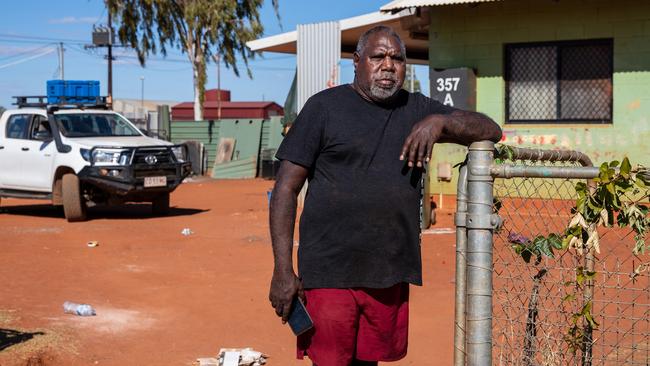
“It’s going to be a huge shame job for all of Australia … people will linger on it.”
Constable Rolfe, the son of a prominent Canberra family, faces a mandatory life sentence if convicted of murder. It is a case that has the potential to affect outback policing for many years.
Walker was aged 19 when he died. An embodiment of the Red Centre’s troubled youth, he had breached bail and snuck home to attend a relative’s funeral.
The police did not follow an understanding to wait until the next day to try to arrest him, something the local community regards as a mark of disrespect.
Older Yuendumu residents grew up with survivors of the 1928 Coniston massacre, the last-known sanctioned killing of Aboriginal people. Those circumstances were different, but comparisons are nonetheless ripe in people’s minds. Many Warlpiri people see modern Australia as trespassing on their ancestral lands and mainstream justice as an affront to traditional tribal law.
Lance McDonald, another Central Australian leader, says Indigenous Australians watching the case see discrimination in the fact Constable Rolfe was bailed while their relatives languish on remand for minor offences.
“If we can’t get things right in this case, it’s a big problem for all of us as Australians,” he says. “It could make enemies between Aboriginal people and the police.”
Walker was born to parents from the Walker and Lane families of Haasts Bluff. Both parents were drinkers and are now dead. He was raised by Ms Oldfield and others of the Brown family in Yuendumu, and also spent time with the Robertson family of his partner. At least four extended groups count among his relatives.
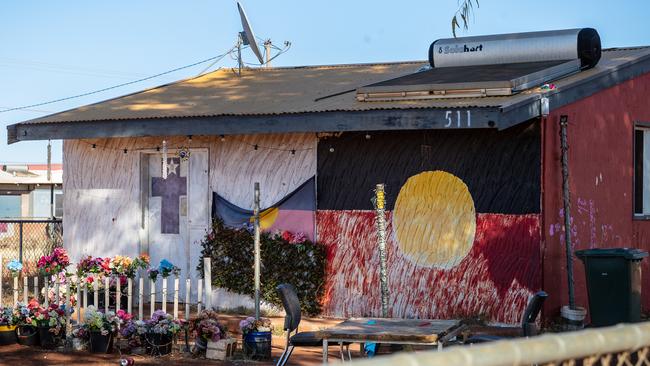
Justice for Walker has become a popular online meme. Some 7500 donors have collectively tipped more than $372,000 into a GoFundMe campaign in Walker’s name. However, some parts of the family are concerned about poor transparency around the initiative and the money, which is being administered by a non-Aboriginal woman.
Bess Price, a Walker on her mother’s side, says the public narrative about Walker’s death has been monopolised by “people who are not immediate relatives”.
Her daughter Jacinta Price, an Alice Springs councillor and Coalition Senate candidate, goes further. “The whole issue has been hijacked by activists, and the actual family has not been respected,” she says. “The activists are encouraging division because they want to control the narrative … there’s more concern about who gets the media kudos than there is about the actual issue.”
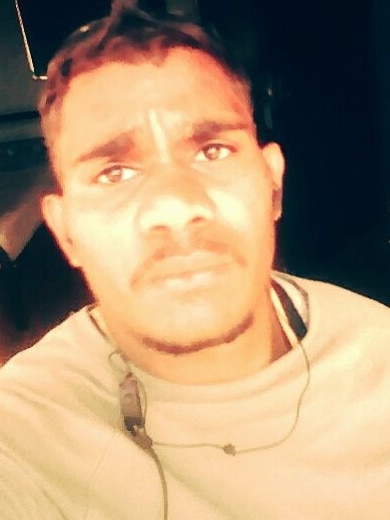
Former NITV anchor Rachael Hocking will provide assistance to some relatives during the trial and interact with particular lawyers. She declined to explain precisely which groups she was assisting.
Most members of Walker’s family The Weekend Australian spoke to were unaware of Hocking’s role.
When Walker was shot, there were no medical staff in the community because nurses had fled a spate of break-ins. Yuendumu locals say the town is doing better, but appearances suggest otherwise. When The Weekend Australian visited Red Centre communities this week, Yuendumu was in conspicuously poor condition. The arts centre has a razor-wire fence, and the community shop is encased in steel plates.
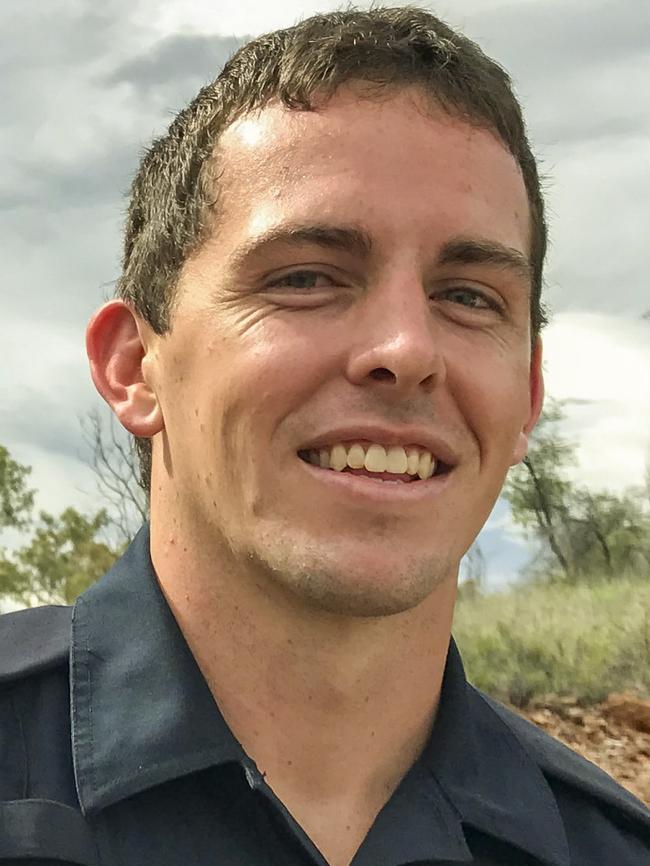
Fred Williams, Warlpiri Yuendumu leader, says the biggest problem remains idleness among the young. “The young people are just sitting about drinking and smoking ganja,” he says.
Back at Walker’s grave, the Brown family spoke of him fondly. He was a troubled man, but he loved and was loved. They remember him playing with his cousins, nieces and nephews, caring for Red Dog and sharing kind words with people.
“I feel sad when I see other young people doing things,” says Margaret Brown. “It makes me think of my grandson, who died when he came here for his grandfather’s funeral.”
Ms Oldfield feels so sad she struggles to speak. “I raised him like a son … he is in my mind all the time,” she says. “I come out here to the graveyard to pray.”


